Unit 3 Could you please clean your room? Section B写作课件16张
文档属性
| 名称 | Unit 3 Could you please clean your room? Section B写作课件16张 |  | |
| 格式 | zip | ||
| 文件大小 | 4.9MB | ||
| 资源类型 | 教案 | ||
| 版本资源 | 人教新目标(Go for it)版 | ||
| 科目 | 英语 | ||
| 更新时间 | 2022-03-14 11:03:17 | ||
图片预览

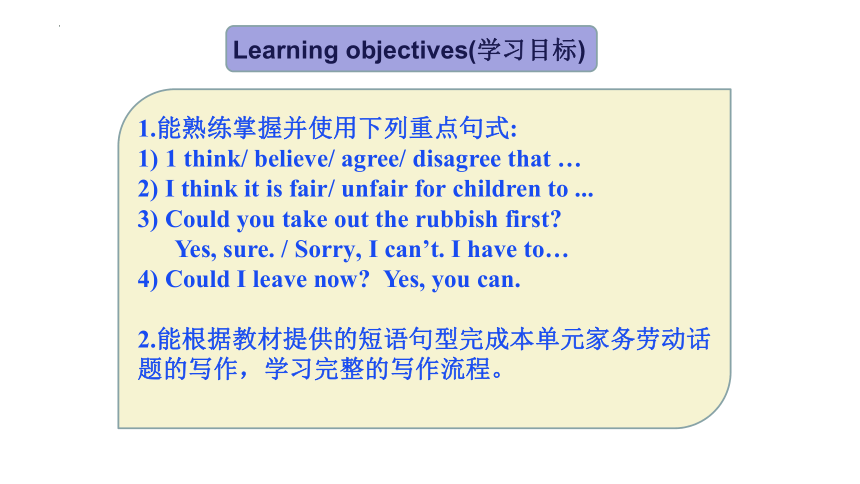
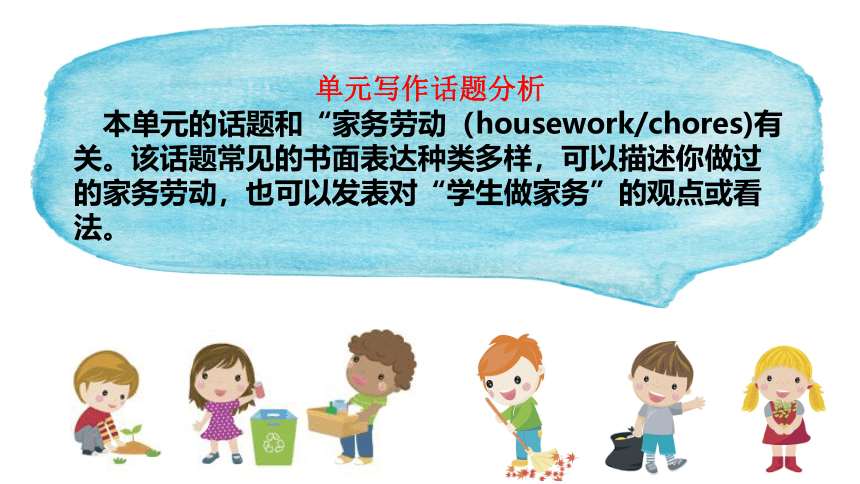
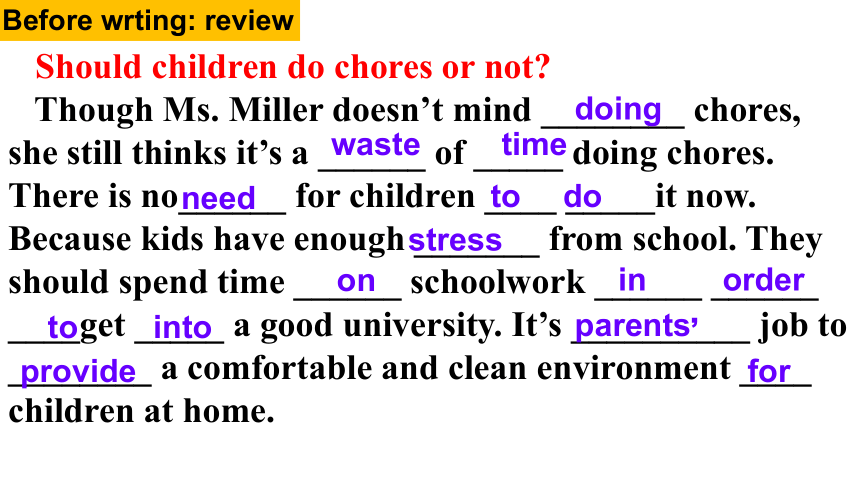
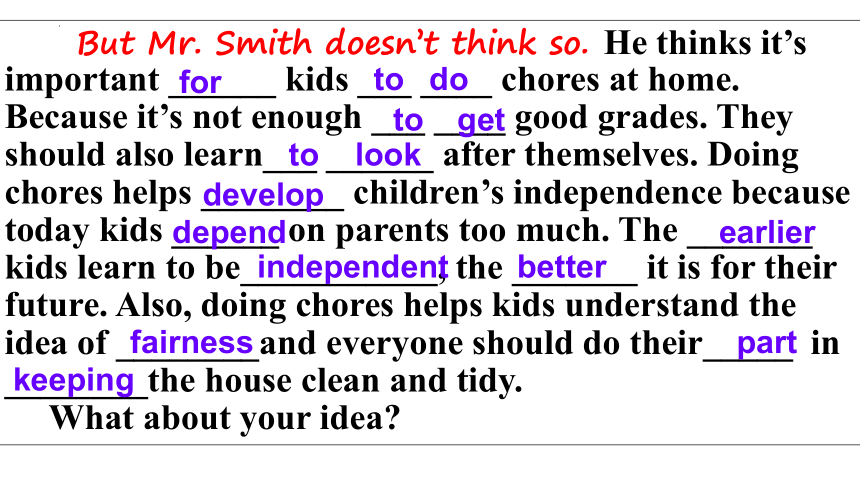
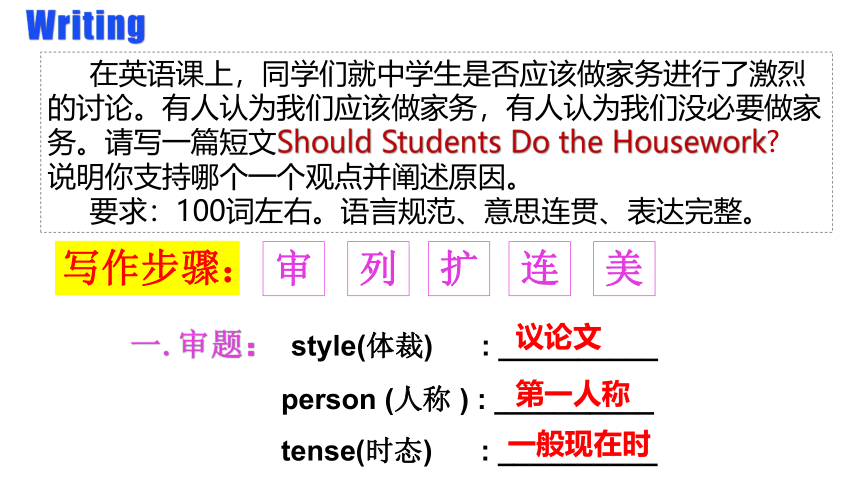
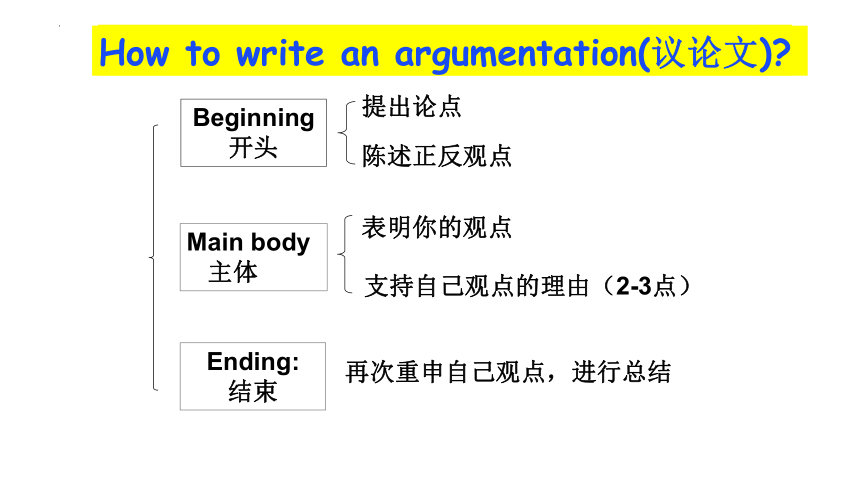
文档简介
(共16张PPT)
Writing
Unit 3
Could you please clean your room
Learning objectives(学习目标)
1.能熟练掌握并使用下列重点句式:
1) 1 think/ believe/ agree/ disagree that …
2) I think it is fair/ unfair for children to ...
3) Could you take out the rubbish first
Yes, sure. / Sorry, I can’t. I have to…
4) Could I leave now Yes, you can.
2.能根据教材提供的短语句型完成本单元家务劳动话题的写作,学习完整的写作流程。
单元写作话题分析
本单元的话题和“家务劳动(housework/chores)有关。该话题常见的书面表达种类多样,可以描述你做过的家务劳动,也可以发表对“学生做家务”的观点或看法。
Before wrting: review
Should children do chores or not
Though Ms. Miller doesn’t mind ________ chores, she still thinks it’s a ______ of _____ doing chores. There is no______ for children ____ _____it now. Because kids have enough _______ from school. They should spend time ______ schoolwork ______ ______ ____get _____ a good university. It’s __________ job to ________ a comfortable and clean environment ____ children at home.
doing
waste time
need
to do
stress
on
in order
to into
parents’
provide
for
But Mr. Smith doesn’t think so. He thinks it’s important ______ kids ___ ____ chores at home. Because it’s not enough ___ ____ good grades. They should also learn___ ______ after themselves. Doing chores helps ________ children’s independence because today kids ______ on parents too much. The _______ kids learn to be___________, the _______ it is for their future. Also, doing chores helps kids understand the idea of ________and everyone should do their_____ in ________the house clean and tidy.
What about your idea
for
to do
to get
to look
develop
depend
earlier
independent
better
fairness
part
keeping
Writing
在英语课上,同学们就中学生是否应该做家务进行了激烈的讨论。有人认为我们应该做家务,有人认为我们没必要做家务。请写一篇短文Should Students Do the Housework
说明你支持哪个一个观点并阐述原因。
要求:100词左右。语言规范、意思连贯、表达完整。
一.审题: style(体裁) : __________
person (人称 ) : __________
tense(时态) : __________
议论文
第一人称
一般现在时
审
写作步骤:
列
扩
连
美
Beginning 开头
提出论点
陈述正反观点
Main body
主体
Ending:
结束
表明你的观点
支持自己观点的理由(2-3点)
再次重申自己观点,进行总结
How to write an argumentation(议论文)
二.列要点
不同的观点:
Some students think/agree with it . However, some students don’t think so/disagree with it.
Most of the students are for it. However, the others are strongly against it.
/don’t hold the same view.
Which side do you agree with
如何引出话题呢?
Recently, we have a discussion/talk about whether students should do the housework.
用陈述句
三.扩写
Do you think children should do some chores at home
如何表达自己的观点 ?
As for me, I think/ strongly believe that students should help out with housework.
I agree/disagree that students should help out with housework.
In my opinion, it is fair/unfair for students to do chores by themselves.
/necessary
Think about the advantages优点 of doing chores :
learn some life skills, develop the independence 培养独立性
know the importance of fairness and responsibity责任
improve the relationship between parents
learn how to work with others 学会与别人相处
make parents happyget a girlfriend or a boyfriend easily
set a good example for your little brothers or sisters
regard as physical exercise,keep a balance of study and life
get such a strong feeling of achievements 成就
...
家庭关系
自身发展与技能
健康
感受
在文中能使用“First, Second, For example, last but not the least”等连接词或过渡词,使得行文流畅,层次清晰。
First of all,...
What’s more,...
In addition
Besides,...
如何结束话题呢?
All in all, it is meaningful and fair for students to do chores.
/In a word, /In short
/To draw a conclusion,
The earlier kids learn to be independent, the better it is for their future.
I think it's fair and meaningful for students to do some housework.
再次重申自己观点,进行总结
The skills and value they learn by doing chores will benifit them in their whole life.
In short/All in all/In a word
/From what I have said
We have a talk about doing housework in an English class.
.Some students think we should do housework, , others believe we needn’t do housework.
, it’s necessary for us students to do some chores.
. , it’s our job to share housework, because we are a member of our family. , we can learn some life skills by doing housework. , the most important thing is that we can develop our independence.
, it’s necessary and helpful to do some housework.
however
In my opinion
First
Second
Here’re my reasons
At last
In a word
Different people have different opinions.
四.连接词,过渡句
选择合适的连接词/句子,使行文更加流畅
五、美
①篇章方面:布局是否完整?逻辑是否合理?要点是否齐全/丰富?
②句子方面:主谓是否一致?时态是否正确?句式是否多样?是否用到连词过度?
③词语方面:代词的主格、宾格等形式使用是否正确?名词单复数是否准确?动词搭配、动词的形式等是否正确?形容词、副词的使用是否达意,与修饰的对象是否相符?
④细节方面:单词拼写、标点符号、大小写等是否正确?
I believe it's important for children to do chores at home. I have several reasons for it.
First of all, doing housework can not only develop our life skills but also make us more independent. After all(毕竟), we can’t depend on our parents all life. Secondly, many studies show that doing some chores can keep us healthy and strong, so we can regard it as(当做) a kind of physical exercise. Finally, by doing some housework, we can share parents' work .It's a good chance for us to show our love and cheer parents up. It also helps us to understand the idea of fairness and responsibility(责任). As a part of family, children should do a part in keeping our rooms clean and tidy.
From what I have said, I think it's meaningful for students to do some housework. It's never too late to learn something useful. Let’s do chores from now on!
Is it good for students to do some housework
What's more, having kids do housework is not robbing(剥夺) their playing time, when they help out around the house with their parents, it will make them know the joy of working and get such a strong feeling of achievements(成就)
These days, many students are too lazy to do chores. They depend on their parents too much and they think it's their parents' job to provide a clean and comfortable environment for them. But it’s wrong. I often help out with housework, such as making the bed, doing the dishes, folding the clothes, cleaning the room and so on. I can get such a strong feeling of satisfaction although it is tiring on the process of doing chores.
In my opinion, doing chores helps to improve the relations between kids and their parents. Besides, it can develop our independence and teaches us how to look after ourselves.
In a word, the earlier kids learn to be independent, the better it is for their future.
Writing
Unit 3
Could you please clean your room
Learning objectives(学习目标)
1.能熟练掌握并使用下列重点句式:
1) 1 think/ believe/ agree/ disagree that …
2) I think it is fair/ unfair for children to ...
3) Could you take out the rubbish first
Yes, sure. / Sorry, I can’t. I have to…
4) Could I leave now Yes, you can.
2.能根据教材提供的短语句型完成本单元家务劳动话题的写作,学习完整的写作流程。
单元写作话题分析
本单元的话题和“家务劳动(housework/chores)有关。该话题常见的书面表达种类多样,可以描述你做过的家务劳动,也可以发表对“学生做家务”的观点或看法。
Before wrting: review
Should children do chores or not
Though Ms. Miller doesn’t mind ________ chores, she still thinks it’s a ______ of _____ doing chores. There is no______ for children ____ _____it now. Because kids have enough _______ from school. They should spend time ______ schoolwork ______ ______ ____get _____ a good university. It’s __________ job to ________ a comfortable and clean environment ____ children at home.
doing
waste time
need
to do
stress
on
in order
to into
parents’
provide
for
But Mr. Smith doesn’t think so. He thinks it’s important ______ kids ___ ____ chores at home. Because it’s not enough ___ ____ good grades. They should also learn___ ______ after themselves. Doing chores helps ________ children’s independence because today kids ______ on parents too much. The _______ kids learn to be___________, the _______ it is for their future. Also, doing chores helps kids understand the idea of ________and everyone should do their_____ in ________the house clean and tidy.
What about your idea
for
to do
to get
to look
develop
depend
earlier
independent
better
fairness
part
keeping
Writing
在英语课上,同学们就中学生是否应该做家务进行了激烈的讨论。有人认为我们应该做家务,有人认为我们没必要做家务。请写一篇短文Should Students Do the Housework
说明你支持哪个一个观点并阐述原因。
要求:100词左右。语言规范、意思连贯、表达完整。
一.审题: style(体裁) : __________
person (人称 ) : __________
tense(时态) : __________
议论文
第一人称
一般现在时
审
写作步骤:
列
扩
连
美
Beginning 开头
提出论点
陈述正反观点
Main body
主体
Ending:
结束
表明你的观点
支持自己观点的理由(2-3点)
再次重申自己观点,进行总结
How to write an argumentation(议论文)
二.列要点
不同的观点:
Some students think/agree with it . However, some students don’t think so/disagree with it.
Most of the students are for it. However, the others are strongly against it.
/don’t hold the same view.
Which side do you agree with
如何引出话题呢?
Recently, we have a discussion/talk about whether students should do the housework.
用陈述句
三.扩写
Do you think children should do some chores at home
如何表达自己的观点 ?
As for me, I think/ strongly believe that students should help out with housework.
I agree/disagree that students should help out with housework.
In my opinion, it is fair/unfair for students to do chores by themselves.
/necessary
Think about the advantages优点 of doing chores :
learn some life skills, develop the independence 培养独立性
know the importance of fairness and responsibity责任
improve the relationship between parents
learn how to work with others 学会与别人相处
make parents happyget a girlfriend or a boyfriend easily
set a good example for your little brothers or sisters
regard as physical exercise,keep a balance of study and life
get such a strong feeling of achievements 成就
...
家庭关系
自身发展与技能
健康
感受
在文中能使用“First, Second, For example, last but not the least”等连接词或过渡词,使得行文流畅,层次清晰。
First of all,...
What’s more,...
In addition
Besides,...
如何结束话题呢?
All in all, it is meaningful and fair for students to do chores.
/In a word, /In short
/To draw a conclusion,
The earlier kids learn to be independent, the better it is for their future.
I think it's fair and meaningful for students to do some housework.
再次重申自己观点,进行总结
The skills and value they learn by doing chores will benifit them in their whole life.
In short/All in all/In a word
/From what I have said
We have a talk about doing housework in an English class.
.Some students think we should do housework, , others believe we needn’t do housework.
, it’s necessary for us students to do some chores.
. , it’s our job to share housework, because we are a member of our family. , we can learn some life skills by doing housework. , the most important thing is that we can develop our independence.
, it’s necessary and helpful to do some housework.
however
In my opinion
First
Second
Here’re my reasons
At last
In a word
Different people have different opinions.
四.连接词,过渡句
选择合适的连接词/句子,使行文更加流畅
五、美
①篇章方面:布局是否完整?逻辑是否合理?要点是否齐全/丰富?
②句子方面:主谓是否一致?时态是否正确?句式是否多样?是否用到连词过度?
③词语方面:代词的主格、宾格等形式使用是否正确?名词单复数是否准确?动词搭配、动词的形式等是否正确?形容词、副词的使用是否达意,与修饰的对象是否相符?
④细节方面:单词拼写、标点符号、大小写等是否正确?
I believe it's important for children to do chores at home. I have several reasons for it.
First of all, doing housework can not only develop our life skills but also make us more independent. After all(毕竟), we can’t depend on our parents all life. Secondly, many studies show that doing some chores can keep us healthy and strong, so we can regard it as(当做) a kind of physical exercise. Finally, by doing some housework, we can share parents' work .It's a good chance for us to show our love and cheer parents up. It also helps us to understand the idea of fairness and responsibility(责任). As a part of family, children should do a part in keeping our rooms clean and tidy.
From what I have said, I think it's meaningful for students to do some housework. It's never too late to learn something useful. Let’s do chores from now on!
Is it good for students to do some housework
What's more, having kids do housework is not robbing(剥夺) their playing time, when they help out around the house with their parents, it will make them know the joy of working and get such a strong feeling of achievements(成就)
These days, many students are too lazy to do chores. They depend on their parents too much and they think it's their parents' job to provide a clean and comfortable environment for them. But it’s wrong. I often help out with housework, such as making the bed, doing the dishes, folding the clothes, cleaning the room and so on. I can get such a strong feeling of satisfaction although it is tiring on the process of doing chores.
In my opinion, doing chores helps to improve the relations between kids and their parents. Besides, it can develop our independence and teaches us how to look after ourselves.
In a word, the earlier kids learn to be independent, the better it is for their future.
同课章节目录
- Unit 1 What's the matter?
- Section A
- Section B
- Unit 2 I'll help to clean up the city parks.
- Section A
- Section B
- Unit 3 Could you please clean your room?
- Section A
- Section B
- Unit 4 Why don't you talk to your parents?
- Section A
- Section B
- Unit 5 What were you doing when the rainstorm came
- Section A
- Section B
- Review of Units 1-5
- Unit 6 An old man tried to move the mountains.
- Section A
- Section B
- Unit 7 What's the highest mountain in the world?
- Section A
- Section B
- Unit 8 Have you read Treasure Island yet?
- Section A
- Section B
- Unit 9 Have you ever been to a museum?
- Section A
- Section B
- Unit 10 I've had this bike for three years.
- Section A
- Section B
